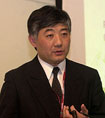|  
back
 |
Toshio Koike
The University of Tokyo
“Asian Water Cycle Initiative (AWCI) Contributing to Global Earth Observation System of Systems (GEOSS)” |
Abstract
Water is one of the key scientific and social issues of this century. Floods and droughts are still not completely controllable and they are leading to large human and socio-economic losses. Large fluctuations of regional and local water cycles intensify water scarcity, threats to freshwater ecosystems, and water-related diseases and associated impacts on society. International recognition of water-related risks has been increasing since the beginning of this century. There is a growing concern about global and regional water issues and the need to address them in a more coordinated way. About 60 % of the world population lives in Asia, and their various social activities including agriculture depend on the bountiful monsoon rain. At the same time, it can be the cause of floods and draughts, and consequently, may be responsible for an enormous amount of human and economic damage.
It is important to recognize the common water-related issues and socio-economic needs on disasters including floods, droughts and landslides, water scarcity, river and water environment, and effects of climate change in Asia and to share ideas on the large natural variation and the big impacts of the human activities in Asia as their backgrounds. To address these issues, well coordinated scientific challenges and combination of global earth observation and physical, chemical, biological and socio-economic information in a local scale are essential as well as long term and mainly localized operational efforts.
Agreement for a 10-Year Implementation Plan for a Global Earth Observation System of Systems, known as GEOSS, was reached by the participating countries and organizations of the ad-hoc Group on Earth Observations (GEO) at the Third Earth Observation (EO) Summit held in Brussels, in February 2005; on that occasion GEO was also formally established. “Improving water resource management through better understanding of the water cycle” has been agreed to as one of the targeted societal benefit areas of GEOSS. Through the lessens from the past and on-going projects, scientists, administrative officers and politicians in Asia are recommended to consider convergence and harmonization of observation activities, interoperability arrangements, and effective and comprehensive data management as the most functional elements as their contributions to GEOSS. A basic plan for “Asian Water Cycle Initiative contributing to GEOSS” was agreed at the 2nd Asian Water Cycle Symposium, and basic ideas on the capacity building for establishing a coordinated water information system of systems were summarized at the GEOSS Symposium on Integrated Observation for Sustainable Development in the Asia-Pacific Region, both in Tokyo, January 2007. These are the initial steps for the cooperative efforts to address to “Improving water resource management through better understanding of the water cycle” in Asia.
Email: tkoike@hydra.t.u-tokyo.ac.jp
back
|


